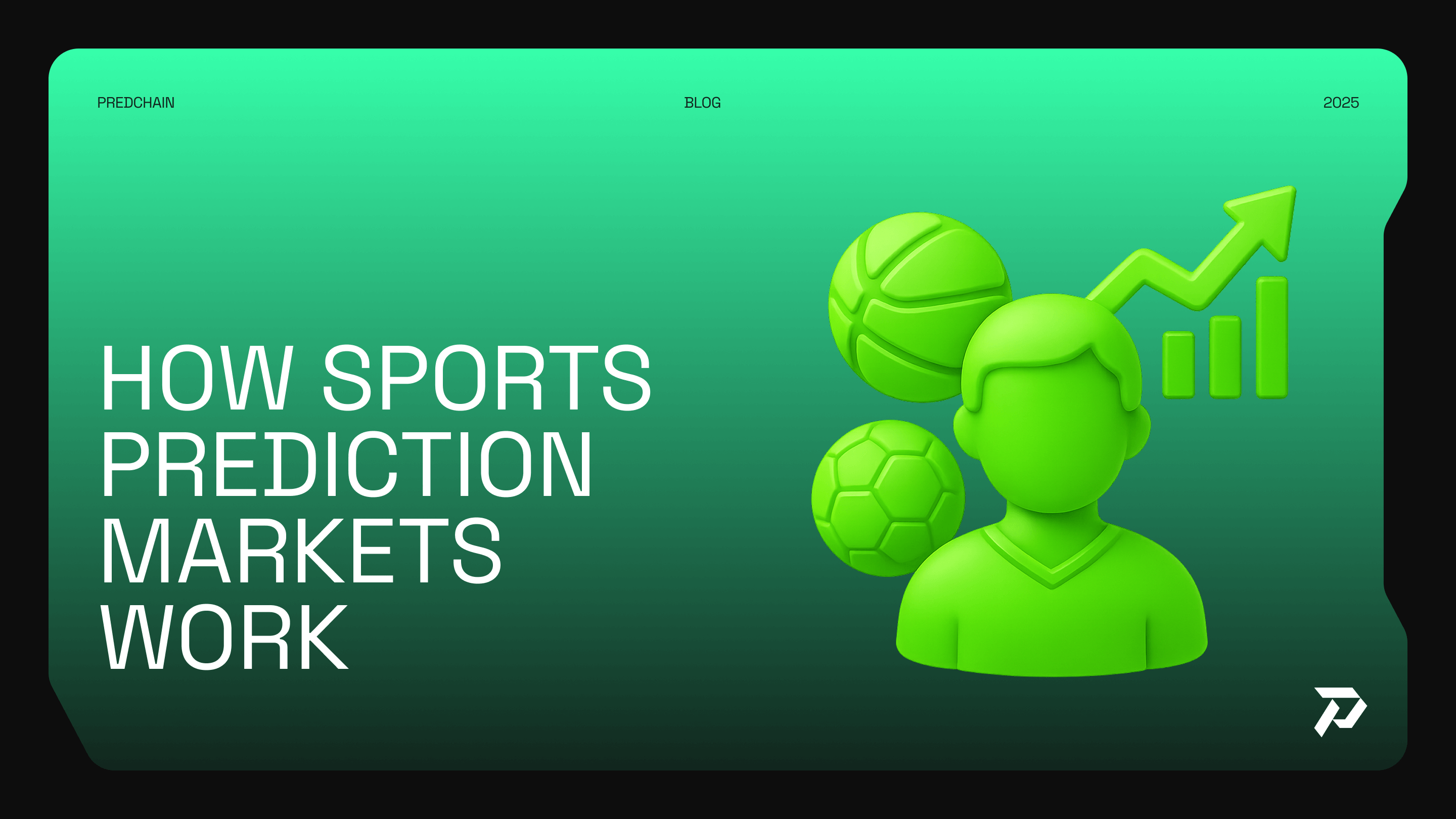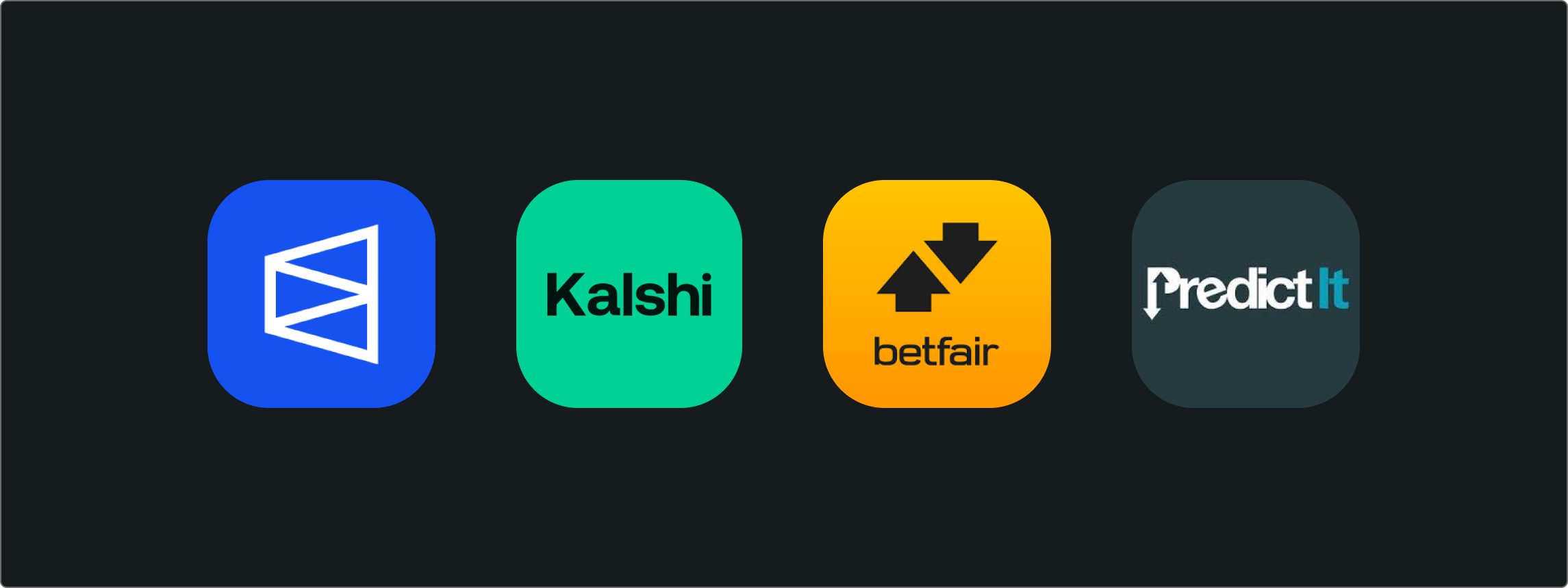How Sports Prediction Markets Work: Platforms, Strategies & Profits

Sports prediction markets are reshaping the way fans and traders engage with athletic events. Unlike traditional sportsbooks, which set odds and accept bets, prediction markets allow participants to buy and sell shares on the probability of various outcomes. The market price itself represents a real-time consensus forecast, reflecting the collective knowledge of all participants.
Over the past decade, platforms for sports prediction markets have expanded from niche financial tools to mainstream alternatives for both casual fans and professional traders. Markets exist for everything from NFL Super Bowl winners and NBA MVPs to Premier League champions and March Madness brackets.
Prediction markets excel in transparency, speed, and accuracy. While sportsbooks rely on centralized odds and human assessment, prediction markets respond immediately to new information—injuries, lineup changes, or even weather conditions—making them especially useful for short-term and seasonal forecasts.
In this guide, we’ll explore the fundamentals of sports prediction markets, compare the best platforms, provide sport-specific trading strategies, discuss legal considerations, analyze fees, and offer actionable insights for both beginners and advanced traders.
What Are Sports Prediction Markets?
Sports prediction markets are financial-style marketplaces where traders buy and sell contracts tied to specific sporting outcomes. Each contract represents a probability of an event occurring, with its price fluctuating as traders update their beliefs.
For example, a market for the 2023 Super Bowl might have Kansas City Chiefs to win at $0.62, implying a 62% probability. If unexpected news arrives—such as quarterback Patrick Mahomes being ruled out—the price could drop to $0.45 within minutes, reflecting a revised 45% implied probability.
Key differences from traditional sports betting include:
- Dynamic Odds: Prices constantly reflect market sentiment and incoming data.
- Crowdsourced Insights: Unlike sportsbooks, prediction markets aggregate information from thousands of participants.
- Trade Flexibility: Traders can enter or exit positions anytime, not just before event start.
Sports Prediction Markets vs Traditional Sportsbooks
Understanding the contrast between prediction markets and sportsbooks is essential for anyone interested in sports trading.
| Feature | Sports Prediction Markets | Traditional Sportsbooks |
|---|---|---|
| Odds Setting | Determined by market demand | Set by bookmaker |
| Transparency | Real-time price movements reflect collective knowledge | Bookmaker margin hidden |
| Liquidity | Can vary, smaller markets may have low liquidity | High for popular events |
| Trading | Buy/sell shares anytime | Bets fixed at placement |
| Market Types | Season-long, game-specific, player performance | Typically game-specific |
| Fees | Platform transaction fees | Built into odds, sometimes hidden |
| Legal Access | Dependent on jurisdiction; decentralized options exist | Varies by region, regulated |
| Accuracy | Often more accurate for long-term outcomes | Can be less responsive to sudden developments |
Example: During the 2023 NBA Eastern Conference Finals, after Giannis Antetokounmpo scored 45 points in Game 6 on May 13, his MVP odds on Polymarket jumped from $0.31 to $0.37 within two hours. Traditional sportsbooks took over 12 hours to adjust their lines.
Prediction markets provide better insight for long-term bets like league championships or MVP races, whereas sportsbooks dominate in volume and liquidity for game-specific wagers.
Best Platforms for Sports Prediction Markets

Several platforms support sports prediction markets, each with unique features and market coverage.
-
Polymarket
- Focus: Crypto-based, real-time markets
- Strengths: Fast price adjustments, transparent transaction data
- Example: Accurately predicted 67% of the 2023 March Madness Elite Eight matchups
-
Kalshi
- Focus: Regulated U.S. events
- Strengths: Legal access, multiple sports markets
- Example: NFL Super Bowl winner market showed immediate price drops when injuries were announced
-
Betfair Exchange
- Focus: Traditional fiat-based sports betting
- Strengths: High liquidity, multiple sports including European soccer
- Fees: 5% commission on net profits
-
PredictIt
- Focus: U.S. political and sports events
- Strengths: Regulated, transparent
- Limitation: Lower market volume compared to Polymarket or Betfair
-
Predchain
- Focus: Everything, including sports events
- Strengths: Decentralized, permissionless
- Limitation: New in the space and lower market volume compared to Polymarket or Betfair
Pro Tip: For portfolio diversification, traders often split exposure across multiple platforms to exploit pricing inefficiencies and arbitrage opportunities.
Arbitrage Example with Exact Numbers: Event: Lakers win NBA Championship
- Polymarket: $0.23 per share
- Betfair: $0.27 per share
- Buy 1000 shares on Polymarket ($230), sell 1000 on Betfair ($270)
- Guaranteed profit: $40 minus platform fees (~$35 net profit)
Sport-by-Sport Market Analysis

NFL and Football Markets
NFL prediction markets see high activity around playoffs and the Super Bowl. Liquidity is strong for championship outcomes but weaker for weekly spreads.
- Historical Accuracy: Prediction markets correctly forecasted the 2022 Super Bowl winner with 71% probability vs 60% for public polling models.
- Platform Preference: Kalshi is preferred for U.S. traders due to legal clarity, while Polymarket is favored by crypto-savvy traders.
- Seasonal Patterns: Betting on season-long outcomes can be more profitable than weekly game spreads because markets respond efficiently to injuries and trades.
Basketball Markets (NBA/College)
- MVP & Championship Markets: Prices fluctuate rapidly based on game performance.
- Example: Giannis MVP odds jumped 20% after a standout playoff performance in 2023.
- Strategy Tip: Track advanced stats like PER (Player Efficiency Rating) and injury reports; markets react within hours.
Baseball Markets
- MLB markets are seasonal, with less volatility than basketball.
- Focus on division winners, World Series odds, and player awards like MVP and Cy Young.
- Liquidity can be low for smaller teams; diversify exposure across multiple markets.
Soccer / International Sports
- European leagues (Premier League, La Liga) offer high liquidity on top teams.
- Betfair Exchange provides the best platform for live market trading.
- Market response is quick to lineups, injuries, and UEFA competitions.
Trading Strategies for Sports Markets
-
Cross-Platform Arbitrage
Exploit price differences across Polymarket, Betfair, and Kalshi for guaranteed profit. -
Market Making
Place buy and sell orders close to predicted odds to profit from bid-ask spreads. -
Seasonal vs Game-Specific Bets
- Seasonal: More stable, better for portfolio allocation
- Game-Specific: High volatility; good for traders monitoring real-time news
-
Data-Driven Decision Making
Use stats, injury reports, lineup changes, and even betting sentiment to inform trades. -
Risk Management
Avoid correlated bets on the same team or event. Allocate capital based on probability-adjusted expected value.
Advanced Trading Techniques
Kelly Criterion Position Sizing: Calculate optimal bet sizes using the formula: f = (bp - q) / b Where b = odds received, p = probability of winning, q = probability of losing
Cross-Sport Correlation Trading: Identify when related events (team success across multiple sports in same city) create arbitrage opportunities
Seasonal Arbitrage Patterns: NFL futures markets often misprice teams in August vs December due to injury and performance updates
Legal Considerations by Region
- United States: Kalshi and PredictIt operate legally; decentralized crypto platforms exist but may have jurisdictional risk.
- Europe: Many countries allow regulated exchanges like Betfair; crypto-based platforms may operate in gray areas.
- Asia & Other Regions: Legality varies; local laws should be checked before participating.
Tip: Understanding sports betting prediction markets legal status in your jurisdiction is crucial to avoid fines or account suspensions.
Fees, Costs, and Profitability Analysis
- Transaction Fees: Polymarket charges a small fee per trade; Betfair charges commission on net profit.
- Hidden Costs: Spread costs in order books can reduce profitability.
- Profitability: Long-term traders benefit from arbitrage and seasonal bets. Short-term game bets may be profitable only with advanced strategies.
Risk Management and Common Mistakes
- Overexposure: Avoid putting all capital on one market or sport.
- Ignoring Correlations: Bets on related events can increase risk.
- Liquidity Issues: Small markets may be hard to exit; always check order book depth.
- Market Timing: Markets react faster than sportsbooks; missing news can cost profits.
Tools and Resources for Sports Traders
- Data Sources: ESPN, Rotoworld, NFL.com, Basketball Reference
- Platforms: Polymarket, Kalshi, Betfair, PredictIt
- Analytics: Python scripts for real-time price tracking, spreadsheet portfolio management
- Community: Reddit r/SportsBetting, Discord trading channels
Conclusion
Sports prediction markets represent an evolution in how we engage with athletic events, offering transparency and real-time probability updates that traditional sportsbooks can't match. While they excel in long-term forecasting and provide unique trading opportunities, they're not universally superior. Sportsbooks still dominate in liquidity and popular event coverage.
Success in sports prediction markets requires understanding platform differences, managing risk across uncorrelated events, and staying informed about sport-specific developments. Whether you're a casual fan looking to test your sports knowledge or a serious trader seeking profit opportunities, prediction markets offer a compelling alternative to traditional betting.
The key is starting small, focusing on sports you understand deeply, and treating it as skill-based trading rather than gambling. As regulatory clarity improves and platform technology advances, sports prediction markets are likely to capture increasing market share from traditional sportsbooks.
FAQ
How do sports prediction markets differ from traditional sportsbooks?
Sports prediction markets aggregate the collective wisdom of participants, with prices reflecting real-time probabilities of outcomes. Unlike sportsbooks, where odds are set by bookmakers, prediction market prices move dynamically as traders buy and sell shares. This can lead to more accurate forecasts, particularly for long-term bets like season champions or award winners. However, sportsbooks often provide higher liquidity for popular events like NFL games or the Super Bowl.
Are sports prediction markets legal?
The legality of sports prediction markets depends on jurisdiction. In the U.S., platforms like Kalshi and PredictIt operate legally, while decentralized crypto-based markets may exist in regulatory gray zones. Traders should always verify their local laws before participating.
Which sports offer the most profitable prediction markets?
NFL and NBA markets typically offer the best combination of liquidity and information efficiency. Soccer markets on Betfair Exchange can be profitable for traders with European league expertise. MLB markets are often less liquid but can provide opportunities for patient traders focused on seasonal outcomes.